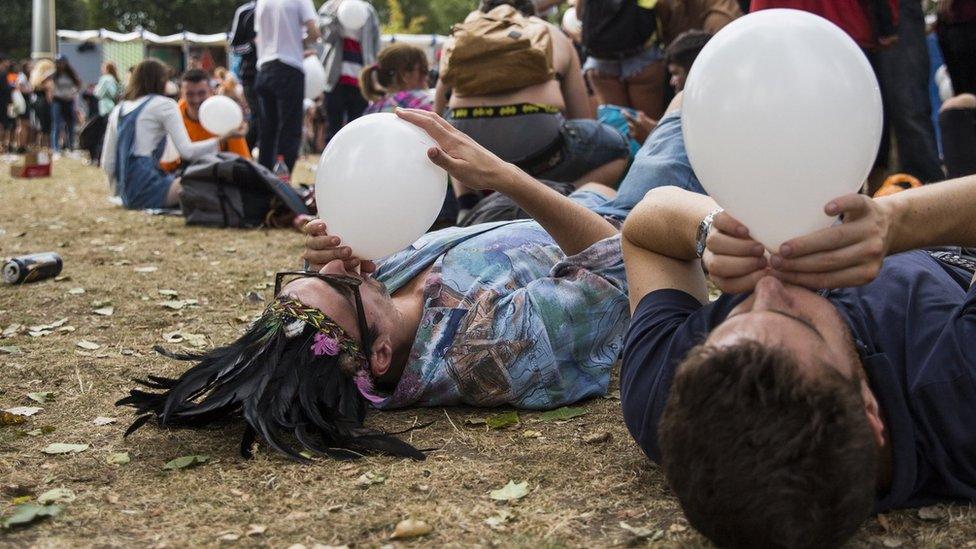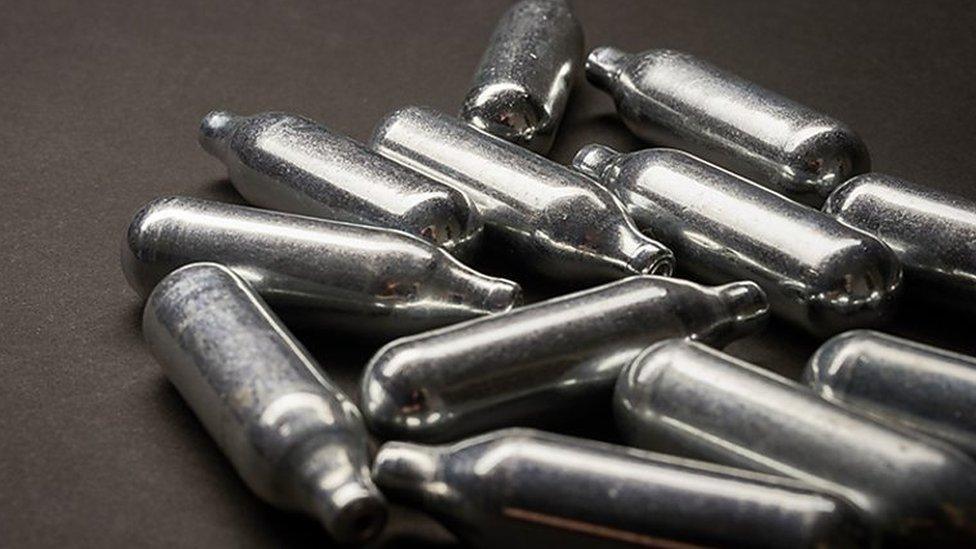Nitrous oxide: Ban on use and sale of laughing gas considered
- Published
Nitrous oxide is sold in metal cannisters
A ban on the sale and use of laughing gas in England and Wales is being considered by the government.
The proposed ban of nitrous oxide, which can have damaging side effects, is part of a drive to tackle anti-social behaviour.
The Home Office has asked for the findings of a report into the harm caused by laughing gas to be delivered sooner than planned.
It says in turn it will consider this review before making a decision.
Nitrous oxide is one of the most commonly used drugs among 16-24 year olds in England, the government says.
Heavy regular use can lead to a range of side effects which include dizziness, weakness in the legs and impaired memory. Inhaling the gas directly from a large canister can be fatal.
Current legislation bans the knowing or reckless supply of nitrous oxide for inhalation - but there have been calls for a ban on all direct consumer sales as part of a tightening up of the law.
The Times - which first reported the story, external - said that under the proposals, exemptions would be allowed for those with "legitimate reasons", such as chefs using it for whipped cream or for pain relief in hospitals.
The paper said Chris Philp, the policing minister, wanted a review already under way into nitrous oxide by the independent Advisory Council on the Misuse of Drugs to be fast-tracked to April, with suggestions a formal announcement on a ban could be made as part of the government's anti-social behaviour strategy due later this year.
Emma Cain, who lost her son after he inhaled butane in 2011, said she tries to stop other youngsters in the street who she sees inhaling volatile substances to warn them about the dangers.
"I tell them 'this is my son, he's in a box, stop doing it, you're hurting yourselves'."
The Times reported that punishment for being caught with or selling nitrous oxide is likely to be similar to sanctions for Class C drugs - those in possession face up to two years in prison or an unlimited fine and a maximum 14-year sentence for supplying or producing the substance.

What is laughing gas?
Widely sold in small metal canisters, nitrous oxide is a colourless gas used as a propellant - for example, in whipped-cream dispensers.
Hospitals and dental practices also use big cannisters of it as an anaesthetic that patients inhale.
Some of those who misuse the substance - sometimes referred to as "hippy crack" - inhale it via a balloon or use a dispenser or "cracker".
Heavy frequent use can lead to a vitamin deficiency that can cause serious permanent nerve damage and lasting paralysis.
But inhaling the gas directly from a large canister is particularly dangerous and can be fatal because it is under such high pressure and comes out extremely cold, which can:
damage the throat and lungs
halt breathing
slow the heart to a dangerous level

The law already bans the knowing or reckless supply of nitrous oxide for inhalation under the Psychoactive Substances Act.
But in October, the British Compressed Gases Association wrote to Ms Braverman asking for a ban on all direct consumer sales.
The drug is widely perceived as lower risk than alcohol, but researchers have raised concerns over the long-term harm it could cause among chronic users.
A study, external comparing the harms of laughing gas to other recreational substances found it was considered more harmful than "poppers" for drug-related dependence, environmental damage and relative impairment of mental functioning, while poppers were more harmful for drug-related mortality, injury and damage.
In the year ending June 2022, 3.9% of 16-24-year-olds reported using nitrous oxide, equivalent to about 230,000 people, according to the Crime Survey for England and Wales, external.
In September, Home Secretary Suella Braverman called for the review into harm caused by nitrous oxide, external.
And earlier this month, Prime Minister Rishi Sunak addressed the issue in a speech about anti-social behaviour and the blight of discarded "nitrous oxide canisters in children's playgrounds".
Related topics
- Published15 November 2022

- Published3 September 2021

- Published3 October 2022
